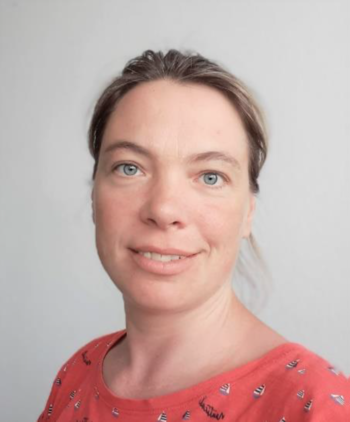Dr. Silvana Schmandt
Gastdozierende

Arbeitsbereich Sonderpädagogik
Sprachentwicklung
Raum 147
14195 Berlin
Sprechstunde
nach Vereinbarung
Ausbildung und Positionen
| Seit 09/2024 |
Gastdozentin, Freie Universität Berlin Fachbereich Erziehungswissenschaftenund Psychologie Sonderpädagogik, Arbeitsbereich Sprachliche Entwicklung |
| 10/2017- 08/2024 |
Projektleiterin (DFG Eigene Stelle) DFG-ANR Projekt ,,Crosslinguistic developmental comparison of the processing of consonants and vowels in early lexical acquisition" (in Kooperation mit Dr. Thierry Nazzi, INCC, Paris) Universität Potsdam, Linguistik |
| 08/2015 - 09/2017 |
Projektkoordinatorin DFG Forschungsgruppe Crossing the borders (FOR 2253) MSCA-ITN European Comission Horizon 2020PredictAble Universität Potsdam, Linguistik |
| 12/2010 - 01/2015 |
Wissenschaftliche Mitarbeiterin (PostDoc) Université Paris Descartes, Sorbonne Paris Cité & CNRS Laboratoire Psychologie de la Perception, Paris, France |
| 10/2008- 11/2010 |
Stipendiatin Promotionsprogramm International Experimental and Clinical Linguistics (IECL), Universität Potsdam |
| 10/2006- 04/2011 |
Wissenschaftliche Mitarbeiterin (Doktorandin) Projekt Characterizing Human Language by Structural Complexity (CHLaSC) |
| 10/2006- 04/2011 |
Promotionsstudium Universität Potsdam (Dr. phil.) Thema der Promotion: About the relation between implicit Theory of Mind & the comprehension of complement sentences |
| 10/1999- 09/2006 |
Studium der Psychologie Universität Potsdam (Dipl.-Pych.) |
Forschungsinteressen
- Sprachwahrnehmung im Kindes- und Erwachsenenalter
- Mögliche Zusammenhänge zwischen Sprachentwicklung und sozial-kognitiver Entwicklung
- Eyetracking als Forschungstool
Publikationen
(note: Poltrock is maiden name of Dr. Silvana Schmandt)
Piot, L., Nazzi, T., Boll-Avetisyan, N., Van Ommen, S., & Schmandt, S. (2025). Phonological biases in lexical access in French and German: Data from a familiar word-recognition conflict task. Infant Behavior and Development, 79, 102070.
Schmandt, S., Nazzi, T., & New, B. (2022). Consonant, vowel and lexical neighbourhood processing during word recognition: New evidence using the sandwich priming technique. Language, Cognition and Neuroscience, 37(9), 1115-1130.
Gonzalez-Gomez, N., Schmandt, S., Fazekas, J., Nazzi, T., & Gervain, J. (2019). Infants’ sensitivity to nonadjacent vowel dependencies: The case of vowel harmony in Hungarian. Journal of experimental child psychology, 178, 170-183.
Poltrock, S., Kwok, C., Chen, H., Cheung, H., & Nazzi, T. (2018). Adult learning of novel words in a non-native language: consonants, vowels, and tones. Frontiers in psychology, 9, 1211.
Nazzi, T., Poltrock, S., & Von Holzen, K. (2016). The developmental origins of the consonant bias in lexical processing. Current Directions in Psychological Science, 25(4), 291-296.
Nazzi, T., & Poltrock, S. (2016). Consonant bias in the use of phonological information during lexical processing: A lifespan and cross-linguistic perspective. In Speech perception and spoken word recognition (pp. 47-64). Psychology Press.
Poltrock, S. & Nazzi, T. (2015). Consonant/vowel asymmetry in early word form recognition. Journal of Experimental Child Psychology, 131, 135–148.
Delle Luche, C., Durrant, S., Poltrock, S., & Floccia, C. (2015). A methodological investigation of the Intermodal Preferential Looking paradigm: Methods of analyses, picture selection and data rejection criteria. Infant Behavior and Development, 40, 151-172.
Delle Luche*, C., Poltrock*, S., Goslin, J., New, B., Floccia, C. & Nazzi, T. (2014). Differential processing of consonants and vowels in the auditory modality: A cross-linguistic study. Journal of Memory and Language 72, 1-15.*the authors contributed equally to this work.
Floccia, C., Nazzi, T., Delle Luche, C., Poltrock, S., & Goslin, J. (2014). English-learning one-to two-year-olds do not show a consonant bias in word learning. Journal of Child Language, 41(5), 1085-1114.
Gonzalez Gomez, N., Poltrock, S. & Nazzi, T. (2013). A “bat” is easier to learn than a “tab”: Effects of phonotactics on infant word learning. PlosOne 8(3), e59601.